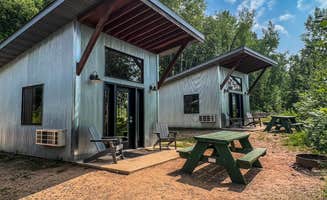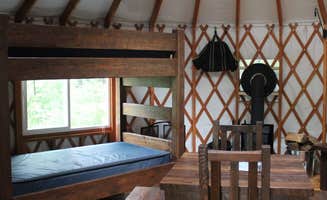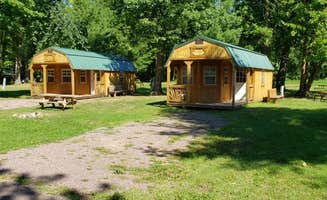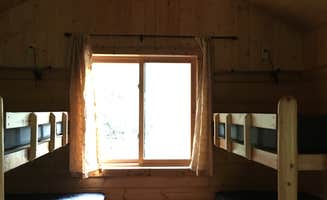Camping opportunities around McGregor, Minnesota include options in the Savanna State Forest and along the shores of Big Sandy Lake. The area sits at an elevation of approximately 1,250 feet with a continental climate that features warm summers and cold winters. Winter camping requires preparation for temperatures that can drop well below freezing, while summer campers should be ready for occasional thunderstorms.
What to do
Hiking at Jay Cooke State Park: The park features diverse trail options ranging from easy walks to more challenging routes. "Make sure you do some climbing on the craggy rocks near the river!" recommends Joshua W. The park's rock formations along the water create natural exploration areas that attract visitors of all ages.
Mountain biking at Cuyuna Country State Recreation Area: The recreation area contains some of Minnesota's premier mountain biking trails built on former mine lands. A reviewer noted, "The mountain biking trails were in great shape and were great for all skill levels. The lake was super clear and the small beach was wonderful." The park offers trails rated from beginner to advanced with distinctive red dirt surfaces.
Fishing at Camp Holiday Resort and Campground: Located on Turtle Lake, the resort provides direct water access with private docks for anglers. "We had site 4, lake side access. The site was amazing, with a dock to the lake," writes Angela J. The connected lakes make excellent fishing opportunities for various species including bass.
Golfing near Minnesota National RV Park: The campground sits inside a golf course property, making it ideal for campers who want to combine outdoor recreation with golf. "The golf course is amazing - one of the nicer public courses in the state. I can see a lot of folks choosing this RV park as a golf vacation," reports Bret S. The 27-hole course offers varied play options.
What campers like
Crystal clear mine pit lakes: Former mining operations have created uniquely clear lakes throughout the region. At True North Basecamp, visitors appreciate the water quality and recreation options. "We brought our paddleboard and had a great time on the quiet lake," writes Stacy M. The depth and clarity of these lakes make them exceptional for paddling and swimming.
Privacy in wooded sites: Gen. C.C. Andrews State Forest campground offers secluded sites surrounded by trees. "It's very nice with beautiful views of the water. Very quiet," notes Silas P. The campground provides natural screening between sites that enhances the outdoor experience.
Proximity to town amenities: Many campgrounds in the region provide easy access to nearby communities. "McGregor is about 15 minutes away and has grocery, gas, hardware store, and restaurants," explains MickandKarla W. This makes resupply convenient while maintaining a rural camping experience.
Family-friendly facilities: Campgrounds often include recreational facilities designed for younger campers. At Camp Holiday Resort, "Camping with two toddlers can be a lot, it helps when there are two nice playgrounds here, a slide, water trampoline, nice beach, and nice, clean bathrooms," according to lexie.
What you should know
Water access considerations: Not all sites with water access have the same setup. "The sites are lakeside with private dock. Sites are close by. Most have water and electric. Full hookups are very limited," notes katherine O. about Camp Holiday Resort. When booking waterfront sites, check if they include private docks or shared access points.
Train noise at some locations: Cloquet-Duluth KOA and other campgrounds in the region may experience train disruptions. "One of the only things that was obnoxious about this park is that there is a frequently used train track nearby - and the trains really lay on whistle," reports one reviewer at a nearby park. Consider packing earplugs if staying at affected campgrounds.
Seasonal considerations: Many campgrounds in the area operate seasonally from May through September or October. Minnesota National RV Park experiences variable occupancy: "With 50+ sites, park was full for the three days around July 4, but was under 50% the rest of the time." Making reservations well in advance for holiday weekends is essential.
Bug preparation: Like many Minnesota woodland areas, insects can be significant during certain periods. A Lost Lake backpacking site visitor noted, "It was pretty buggy and ticks were bad, but that's to be expected." Bringing appropriate repellents and checking for ticks regularly is advisable.
Tips for camping with families
Look for campgrounds with water recreation: Crosslake Campground offers multiple water access points. "This has 2 boat ramps and a fishing pier. You can beach your boat but the spots can fill up pretty fast," advises Melissa A. The combination of boating facilities and swimming areas makes it suitable for families with varied interests.
Check site spacing: Campground density varies throughout the region. "Every campsite seems to be well-treed and relatively private, providing a perfect atmosphere to just enjoy nature from your campsite," reports one Jay Cooke State Park visitor. Families needing more space should research site dimensions and privacy factors before booking.
Consider glamping close to McGregor, Minnesota: For families new to camping, cabins provide comfort while maintaining an outdoor experience. "Cabins are basic but clean with comfortable beds, a table and AC! Right on the lake and direct access to the trails," reports Orange D. about True North Basecamp. The heated cabins work well for families with small children or during shoulder seasons.
Reserve recreation equipment ahead: Many facilities offer equipment rentals, but availability can be limited. "You can also rent water toys, boats and pontoons. You can also bring your own boat and rent dock space," explains Nick K. at Camp Holiday Resort. Securing these rentals when making campground reservations ensures access during peak periods.
Tips from RVers
Check hookup distances: At Banning RV Park and Campground, water connections can require planning. "Our water source ended up being 75' plus from our RV. Thankfully I just happened to be carrying the extra hose for several years but never had to use it before," warns Sam C. Bringing additional hose lengths can prevent hookup challenges.
Site leveling requirements: Site conditions vary across campgrounds. "It is a mixed bag of tricks here as the sites can be level and some others are not at all," notes Scott M. about Banning RV Park. Bringing additional leveling blocks is advisable, particularly for larger rigs.
Seasonal occupancy patterns: Understanding when campgrounds fill helps with planning. At Minnesota National RV Park, "During our 7-night stay, along with the four seasonal campers, only one other camper came in for 2 days," observes MickandKarla W. Shoulder seasons may offer more availability and quiet camping experiences for those with flexible schedules.
Utility locations: RV sites often have utilities positioned differently than expected. "The utilities are in the far back of the site. I needed about 20' of sewer, electric, and water hose to reach my rig," explains a reviewer at Minnesota National RV Park. Bringing extension cords and extra-length hoses ensures successful connections regardless of site configuration.





